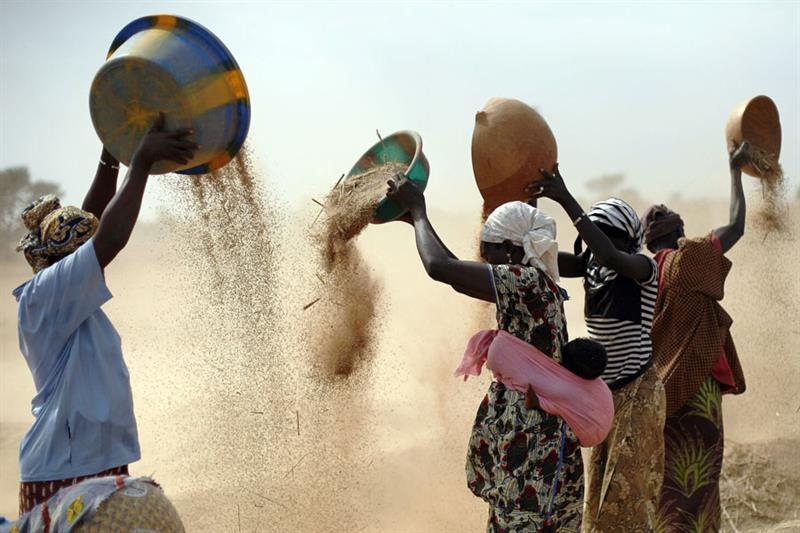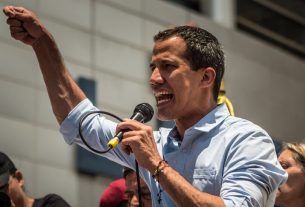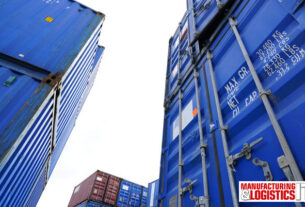Solutions to world problems have been brought to a halt until Moscow and the West resolve their own, many observers believe.
The world turned to Ukraine and Russia after their military crisis broke out on 24 February.
“No country will look in any other direction until the Ukraine crisis is resolved,” Abdel-Meguid Al-Kabbati, former minister of information in Yemen, told Al-Ahram Weekly.
South Sudan parliamentarian and former minister of agriculture Wilson Magaya concurred. Putting off Africa’s problems, temporarily, is not a form of racism against the continent’s developing nations, he explained. “The Ukraine-Russia crisis has affected the entire world in its critical food and energy sectors.”
Third World leaders are extremely anxious. They have not been this tense since the fall of the Soviet Union, when the majority of developing countries lost the international support to which they had been accustomed since their independence.
“For decades starting in the 1960s, newly independent countries had benefited from the US and the Soviet Union – the rival parties in the Cold War – receiving arms, food supplies, and scholarships, and other aid,” Al-Kabbati said. “People in Yemen, for example, are suffering from malnutrition. It may get worse, and Yemen may be subject to famine, if the country does not receive immediate help. The same goes for many countries.”
The UN has warned of a worsening humanitarian situation in Yemen, Ethiopia, Somalia, South Sudan, Nigeria, and a number of African Sahel countries.
Many countries in Africa and Asia have been unable to provide enough food since the outbreak of war, which has affected the prices of grains, legumes, dairy products, medicines and fuel, such as gasoline, diesel and gas. Moreover, electricity bills have doubled in industrialised European countries.
Together, Russia and Ukraine supply the world market with a little over 40 per cent of its wheat needs, more than 25 per cent of its corn, and 55 per cent of its sunflower oil.
Russia is the world’s largest natural gas producer and one of its largest producers of oil. In addition to being a main exporter of coal, Moscow is indispensable for dozens of developing countries that want to buy quality weapons at low prices to form relatively large armies at an affordable cost.
“Unlike China, which depends on the West for investment and manufacturing to export its products, Russia does not depend on the West for investments or exports. It is largely independent. Hence, the Western sanctions will not affect it this much,” Magaya said. “Due to the central role it plays, Moscow was able to intervene in the Syrian War and the conflict between Armenia and Azerbaijan to strike rapprochements with West African countries that saw coups.”
Russia interfered in the Syria War to stop the flow of oil and gas from the Middle East to Europe via the pipelines of Syria and Turkey which were presented as an alternative to Russian energy, Magaya explained. This was the main reason behind the disagreement between Russia and Turkey, with the former believing that Ankara wants the regime of Syrian President Bashar Al-Assad down to implement its scheme.
When the Turkish plan in Syria failed, the fighting between Armenia and Azerbaijan erupted.
Turkey sided with Azerbaijan not only due to its historical animosity with Armenia, “but also to make way for Azerbaijani gas to reach Europe via Turkey’s pipelines,” said Ali Zein Al-Abidine, a professor of political science at Khartoum University.
It is no that secret Moscow took part in the ceasefire agreement between Baku and Yerevan to limit Turkey’s role.
“A similar thing happened in Africa. Military coups erupted in Mali, Burkina Faso, and Guinea-Conakry and these countries immediately drew closer to Moscow,” Zein Al-Abidine added.“These African regimes wanted to step away from France which, in the view of many observers, failed to curb terrorism in the African Sahel. Moscow, meanwhile, wanted to prevent oil and gas from flowing from Nigeria, Ghana, Gabon, and Guinea to Europe,” he noted.
Nigeria approached Morocco to convey its gas and oil to Europe through Rabat. The project, however, was beyond the financial capabilities of African and Arab countries.
Another plan is for Nigeria to transport its energy sources north via Algeria, which owns two pipelines that carry its own natural gas to Europe – one directly to Spain, the other via Morocco. That way, Nigeria can meet 12 per cent of the gas needs of European Union countries. Unfortunately, security issues stand in the way.
An alternative route for Nigerian energy is via the sea, but the cost is unattainable.
“Either way – by land or sea – it is not possible due to Russia’s moves to maintain its control over the energy field. Meanwhile, I do not think there are alternatives in the food sector in the foreseeable future,” Zein Al-Abidine pointed out.
“The Western media has turned its back on Africa’s problems since the Ukraine war broke out,” Magaya lamented, for his part.
Many African and developing countries, such as Yemen, are suffering from regional or civil wars, unprecedented waves of drought, and a general failure on the part of the regime. “Civil War has been ongoing in Sudan since 2013. The country is on the precipice of famine.”
South Sudan gained independence in July 2011, making it the last country in the world to achieve secession. It did not enjoy peace for long, however. Fighting broke out between the Dinka tribe, from which President Salva Kiir hails, and the Nuer ethnic group, led by Vice President Riek Machar.
According to UN and international rights agencies, some 450,000 people died in the war and half the population was displaced. About two thirds of the South Sudanese are in need of immediate aid, otherwise the country will slip into famine.
Somalia is also in danger of drought and millions of its people are suffering from hunger. Somalia has been in turmoil since 1991 when its president Siad Barre was toppled. The government is fighting against the terrorist organisation Shabab Mujahideen which has embarrassed the regime amid retreating international and African support.
The situation is more complicated in Ethiopia. Locusts have been attacking Ethiopian crops for the past eight years, the north is undergoing a Civil War with the Tigray that killed more than 100,000 people, millions have been displaced, and the UN warned that drought may affect 20 million people in different parts of the country.
Western media and rights reports have accused the government of Prime Minister Abiy Ahmed of subjecting the Tigray people to famine by blockading the region in which seven million people live, in addition to cutting off banking services, communications, transportations, and food, medicine and fuel supplies.
Many observers fear famine and Civil War in Tigray and Oromia in the centre, as well as in Somalia in the south, will lead to the disintegration of Ethiopia. In this case, the repercussions will spill over into the neighbouring Horn of Africa countries as well as in the east and centre of the continent, in countries such as Kenya.
Kenya is not faring well following the presidential elections, the results of which was not to the satisfaction of many ethnicities.
Meanwhile, in Congo, tensions have re-emerged in the east after a few years of peace.
Cameroon is witnessing a Civil War between the French-speaking group that controls the state and the English-speaking segment that has suffered from marginalisation since independence.
“The occupation divided Africans. At present, the media sheds light on what is of interest to Western colonial powers only,” Magaya said. “The displacement of Ukrainians has directly affected European Union countries. Russia, meanwhile, is almost monopolising energy in Europe. Western media cares only about the West.”
Russia is the main exporter of strategic foods, such as grains and cooking oil, which is why food prices skyrocketed once the Russian forces moved towards Ukraine. This has urged many countries, such as Indonesia, Turkey, Brazil, and Egypt to try to stop the fighting between Russia and Ukraine to prevent the disruption of supply chains the world over.
“Without Russia, Africa’s least developing countries will not have enough food to meet the needs of their peoples. These countries may suffer political turmoil as a result,” Al-Kabbati said. “The Russia-Ukraine war will lead to the overthrow of the weakest regimes, spiking tensions across the world.”
*A version of this article appears in print in the 22 December, 2022 edition of Al-Ahram Weekly
Short link:



